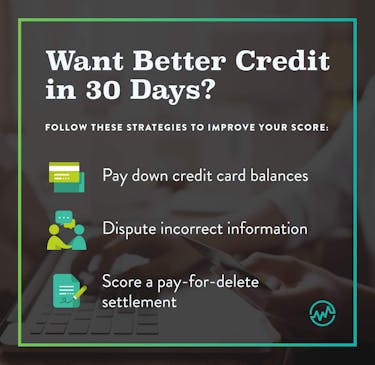

Get Access to 250+ Online Classes
Learn directly from the world’s top investors & entrepreneurs.
Get Started NowIn This Article
If you’re struggling with bad credit — the good news is you aren’t stuck. You don’t have to be a victim of bad credit scores any longer.
Keep reading to learn how to improve your credit quickly.

How To Improve Your Credit Score in 30 Days
Strategy #1: Pay down credit card balances.
Did you know that with the right tools, you can know exactly how to improve your credit score in 30 days?
If you’re wondering how to improve your credit score in 30 days, paying down your credit cards is often a great place to start. You might not know it, but your credit scores will probably take a hit when you revolve an outstanding balance on your credit card accounts from one month to the next.
Why does your credit card balance matter, especially if you keep the bill paid on time? The answer is simple: People who utilize a higher percentage of their credit card limits are statistically higher risks.
Look, it’s not personal. It’s in math.
Credit scoring models, like FICO and VantageScore, evaluate your credit reports and predict how likely you are to go 90 days late on any account in the next 24 months. Higher credit card utilization equals a more likely chance you’ll hit that 90-day late mark. As such, high utilization can damage your scores.
A whopping 30% of your FICO credit scores are largely based upon your credit card utilization ratios. If you pay your balances down (especially heavily utilized credit card accounts), you might be pleasantly surprised with the credit score results.
Can’t afford to pay off your credit card balances in full? Consolidating all your revolving credit card debt into an installment account, like a personal loan, could still bring your revolving utilization ratio down to 0%.
In other words, a consolidation loan might boost your credit scores and could save you money at a lower rate. Just make sure to manage your new account well. Otherwise, that new loan could come back to bite you — and your credit scores — in a bad way.
Strategy #2: Dispute incorrect information.
Another tip that can help you know how to improve your credit score in 30 days is to review the information on your three credit reports from Equifax, TransUnion, and Experian. You can claim a free copy of your three reports once every 12 months from AnnualCreditReport.com.
Comb through your reports carefully to look for errors. When incorrect negative information appears on your credit reports, it can wreak havoc on your scores. However, if you succeed in getting those credit reporting errors removed, you can reverse the damage.
Here are a few potential issues you should look out for when you review your reports:
- Accounts which don’t belong to you
- Accounts with incorrect dates
- Items which have been on your reports too long
- Incorrect late payments
- Personal information mistakes (names, addresses, social security numbers, etc.)
- The same account reported multiple times
If you find mistakes in any of your reports, the Fair Credit Reporting Act allows you to dispute them. Not every dispute is successful, of course.
However, if the investigation into your claim comes back in your favor, the deletion of a negative account could possibly boost your credit scores right away.
Strategy #3: Score a pay-for-delete settlement.
Out-of-the-box strategies could help you discover how to improve your credit score in 30 days as well. One such option is convincing a collection agency to agree to a pay-for-delete settlement.
Before we talk about pay-for-delete settlements, let’s back up for a moment. If you have collection accounts on your credit reports, those negative items are likely hurting your credit scores. Sadly, paying off those collection accounts may not erase the damage.
Older credit scoring models, like the versions of FICO Scores which many lenders still use, were built to look out for any negative history on a credit report — like collection accounts.
The balance on a collection account, however, doesn’t really matter so much to those older scoring models.
A $5,000 collection and a $0 collection might damage your credit scores roughly the same amount.
Therefore, paying or settling an old collection often won’t do much for your credit scores. If a collection agency accepts your payment and updates the account to a $0 balance, the negative account would still be hanging out on your credit reports, potentially damaging your scores.
If you can get a collection agency to agree to delete the negative account from your reports entirely after you pay it, that’s another story. There’s a chance getting the bad account removed could make your credit scores pop up in the right direction.
Here’s the catch. The credit bureaus aren’t fans of pay-for-delete arrangements.
They don’t want collection agencies to remove accurate accounts simply because they are paid.
There’s nothing illegal about deleting a paid collection account. That’s a myth. Credit reporting is voluntary as far as the law is concerned.
However, collection agencies sign agreements with the credit bureaus saying they won’t delete negative accounts simply because they’re paid. Occasionally you might find a collection agency that will agree bend the rules, but it’s a bit of a long shot.
How To Improve Your Credit Score In 30 Days

Now that you know how to improve your credit score in 30 days — before you go overboard with your expectations — it’s a good idea to step back and take a deep breath. When it comes to improving credit, there are a lot of people out in the world who make some big, unrealistic claims. If a promise sounds too good to be true, it probably is.
Unfortunately, there are no magic wands when it comes to your credit. It usually takes time to see major improvements in your credit scores. But not always...
There are some real, proven ways to see a boost in your credit scores right away.
Not convinced? Consider trying out a few of the strategies listed above and see if any of them work for you.
What do you have to lose?






